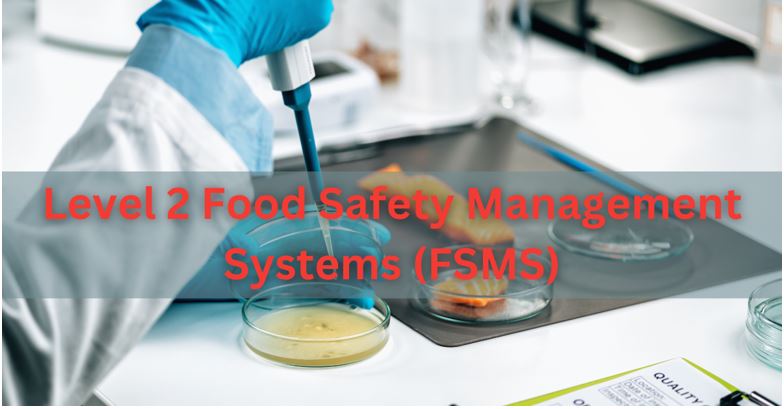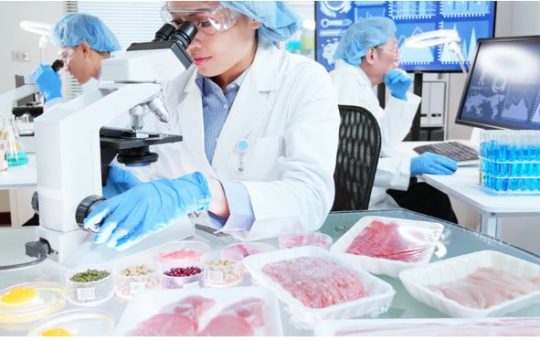
Level 2 Food Safety Management Systems (FSMS)
Course Overview:
The Level 2 Food Safety Management Systems (FSMS) course is designed for individuals who work in food production, catering, and food service sectors. This course offers a detailed understanding of how to manage and implement food safety management systems in your organization. Focusing on key standards like HACCP (Hazard Analysis and Critical Control Point), ISO 22000, and other regulatory frameworks, this course will guide you on how to establish effective food safety systems that ensure the safety and quality of food at every stage of production. By completing this course, you will be equipped to manage food safety risks, improve practices, and maintain compliance with food safety regulations.
Why Take This Course?
- Gain Expertise in FSMS: Understand how to design, implement, and manage food safety management systems effectively, ensuring food safety at every level of your organization.
- Comply with Food Safety Regulations: Learn how to align with international standards such as HACCP and ISO 22000, meeting both legal and customer requirements.
- Improve Food Safety Practices: Equip yourself with the skills to reduce food safety hazards and improve the safety and quality of food produced or handled within your business.
- Advance Your Career: Strengthen your profile with practical knowledge and skills that will help you take on leadership roles in food safety management.
Learning Outcomes:
Upon successful completion of the course, you will be able to:
- Understand the principles of food safety management and the key components of FSMS.
- Implement and manage food safety management systems like HACCP and ISO 22000 within your organization.
- Identify and assess food safety hazards, and apply appropriate risk management measures.
- Develop food safety policies and procedures that ensure compliance with national and international food safety standards.
- Monitor and verify the effectiveness of food safety management systems and make improvements as necessary.
- Communicate and train staff on FSMS procedures and food safety best practices.
Course Content:
- Introduction to Food Safety Management Systems
- Understand the role and importance of FSMS in ensuring food safety and quality.
- Learn the principles behind FSMS frameworks like ISO 22000, HACCP, and BRC Global Standards.
- Food Safety Hazards and Risk Management
- Learn about biological, chemical, and physical food safety hazards.
- Understand how to assess, evaluate, and control food safety risks using the FSMS approach.
- Implementing FSMS (ISO 22000 & HACCP)
- Dive into the key components of ISO 22000 and HACCP systems, and understand how to implement them effectively in your organization.
- Learn how to develop, document, and maintain food safety plans based on FSMS principles.
- Setting Critical Control Points (CCPs) and Establishing Procedures
- Understand the concept of Critical Control Points (CCPs) and how to establish monitoring procedures to ensure food safety throughout the production process.
- Learn how to identify, set, and monitor CCPs for continuous food safety management.
- FSMS Documentation and Record Keeping
- Learn the importance of documentation within FSMS, including hazard analysis, food safety policies, and audit reports.
- Understand the key documentation requirements for ensuring compliance and continuous monitoring of food safety systems.
- Auditing and Continuous Improvement of FSMS
- Understand how to conduct audits of food safety management systems to verify their effectiveness.
- Learn the steps to improve food safety management systems continuously through corrective actions, audits, and regular reviews.
- Training and Communication in FSMS
- Develop effective food safety training programs for your team to ensure that all members are fully aware of FSMS practices.
- Learn how to communicate FSMS standards and procedures clearly within your organization.
Career Progression:
After completing the Level 2 Food Safety Management Systems (FSMS) course, you will be prepared for various roles in food safety and quality management, including:
- FSMS Manager: Oversee the implementation and management of food safety systems within food production or catering establishments.
- Food Safety Auditor: Conduct audits to ensure that food safety systems are being followed and identify areas for improvement.
- Quality Assurance Officer: Monitor food safety practices, ensuring that FSMS standards are maintained at all times.
- HACCP Coordinator: Coordinate and manage the HACCP system, ensuring that the critical control points and food safety processes are effectively monitored.
- Food Safety Trainer: Train employees on food safety standards and FSMS protocols, ensuring compliance and reducing risk in food operations.
Our assessment process is designed to ensure every learner achieves the required level of knowledge, skills, and understanding outlined in each course unit.
Purpose of Assessment
Assessment helps measure how well a learner has met the learning outcomes. It ensures consistency, quality, and fairness across all learners.
What Learners Need to Do
Learners must provide clear evidence that shows they have met all the learning outcomes and assessment criteria for each unit. This evidence can take different forms depending on the course and type of learning.
Types of Acceptable Evidence
Assignments, reports, or projects
Worksheets or written tasks
Portfolios of practical work
Answers to oral or written questions
Test or exam papers
Understanding the Structure
Learning outcomes explain what learners should know, understand, or be able to do.
Assessment criteria set the standard learners must meet to achieve each learning outcome.
Assessment Guidelines
All assessment must be authentic, current, and relevant to the unit.
Evidence must match each assessment criterion clearly.
Plagiarism or copied work is not accepted.
All learners must complete assessments within the given timelines.
Where applicable, assessments may be reviewed or verified by internal or external quality assurers.
Full learning outcomes and assessment criteria for each qualification are available from page 8 of the course handbook.
Top Courses
No results found.
Related Courses
Let's Get in touch
Deleting Course Review
Course Access
This course is password protected. To access it please enter your password below:



